外研(新标准)版九年级上册 Module 12 Save our world Unit 3 Language in use 课件(共24张PPT)
文档属性
| 名称 | 外研(新标准)版九年级上册 Module 12 Save our world Unit 3 Language in use 课件(共24张PPT) |
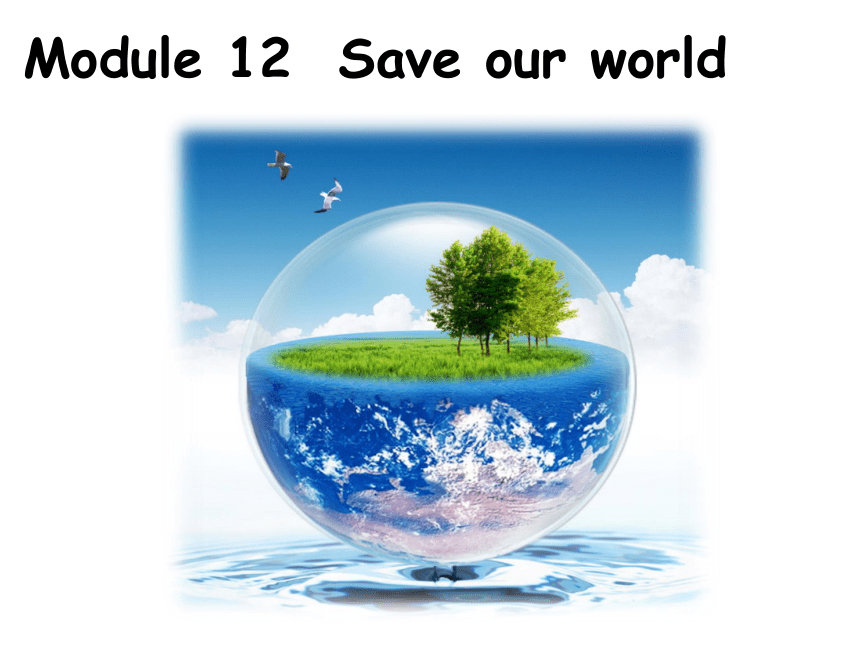
|
|
| 格式 | ppt | ||
| 文件大小 | 3.4MB | ||
| 资源类型 | 教案 | ||
| 版本资源 | 外研版 | ||
| 科目 | 英语 | ||
| 更新时间 | 2023-01-19 20:48:14 | ||
图片预览

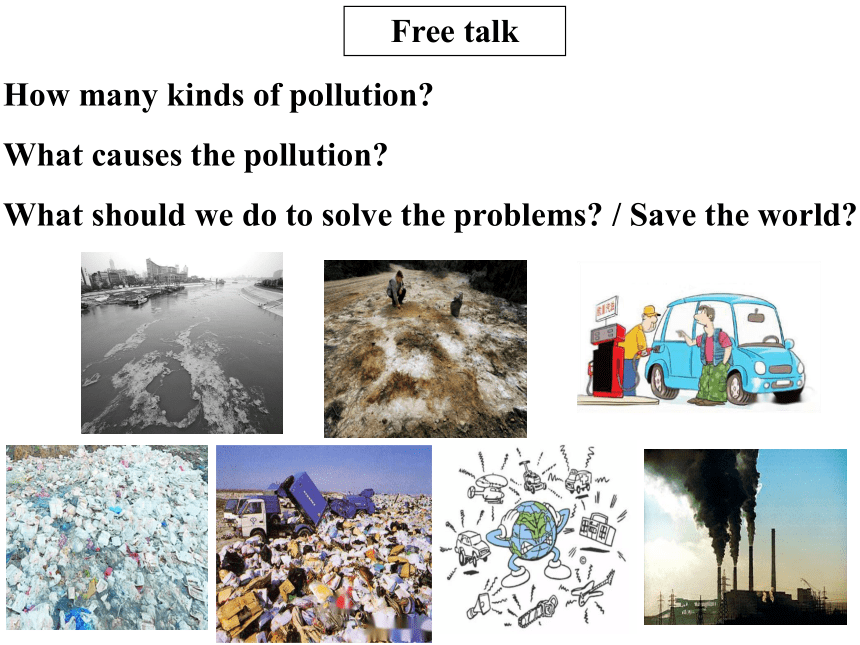
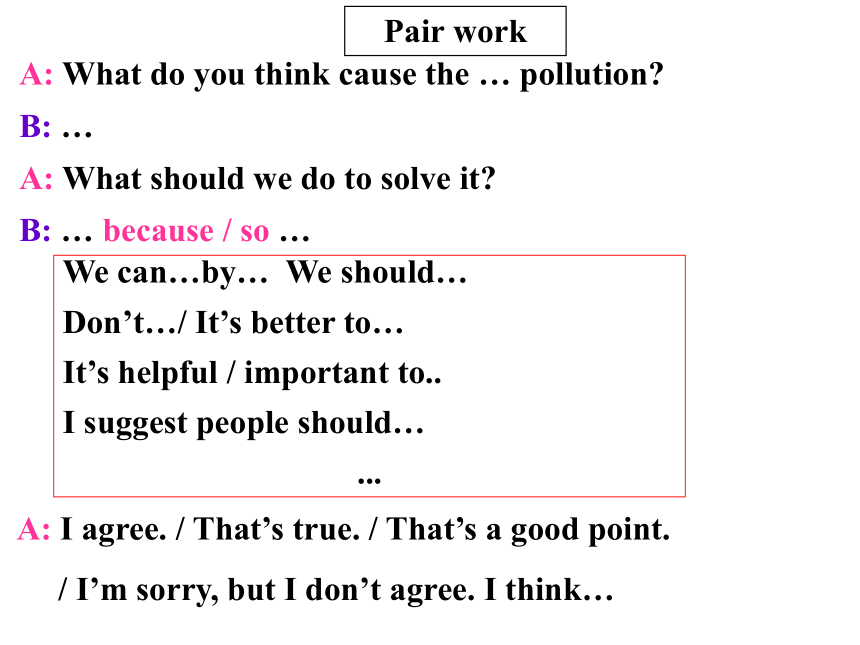
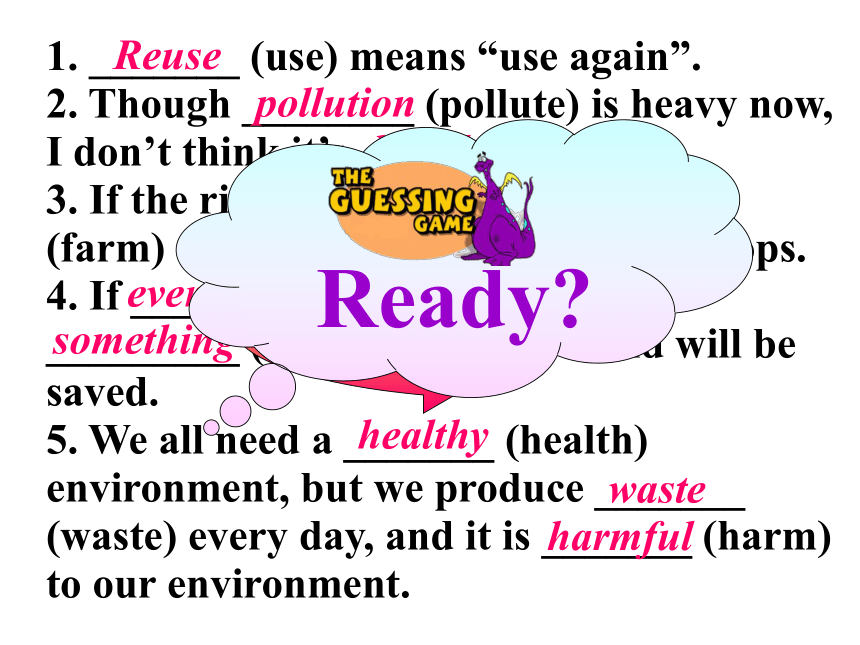
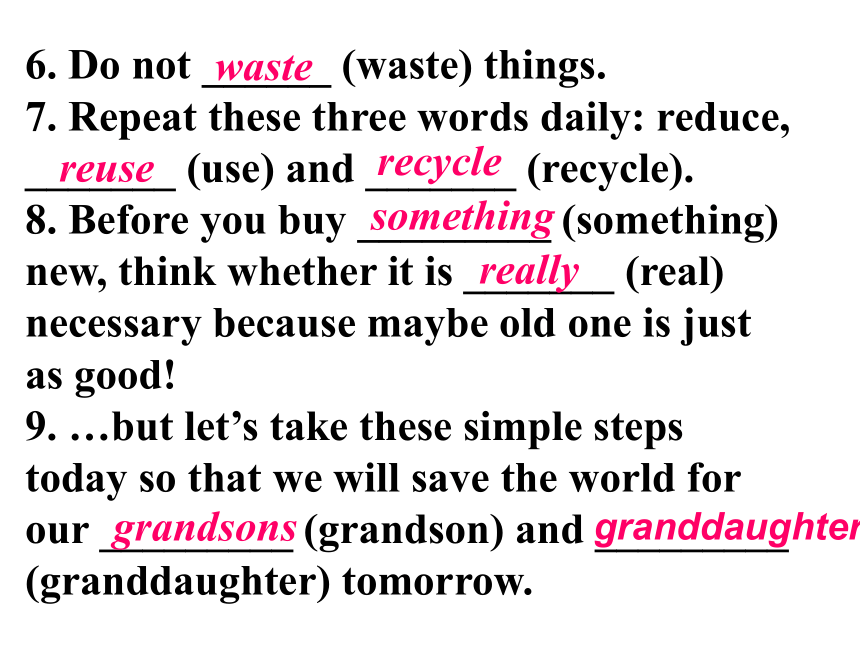


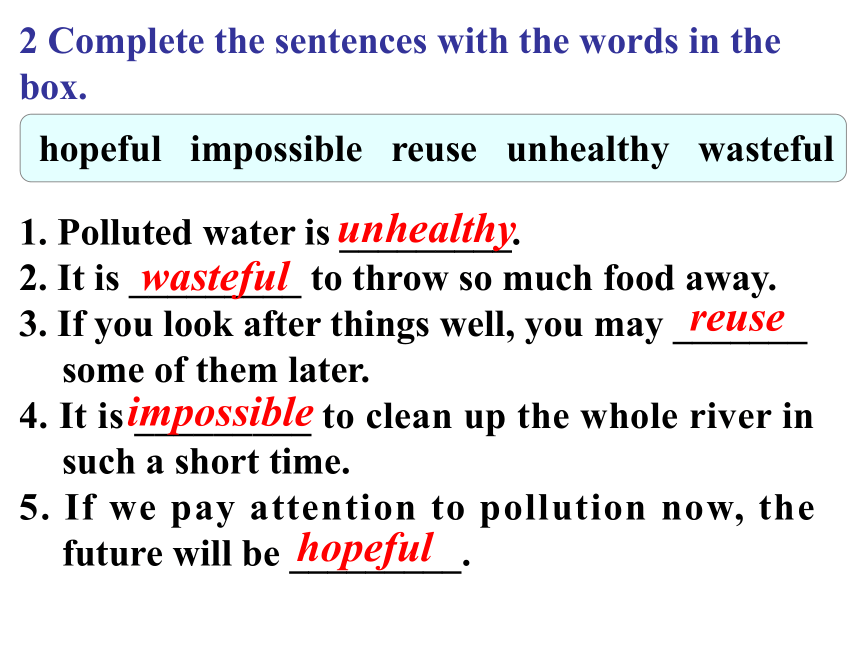
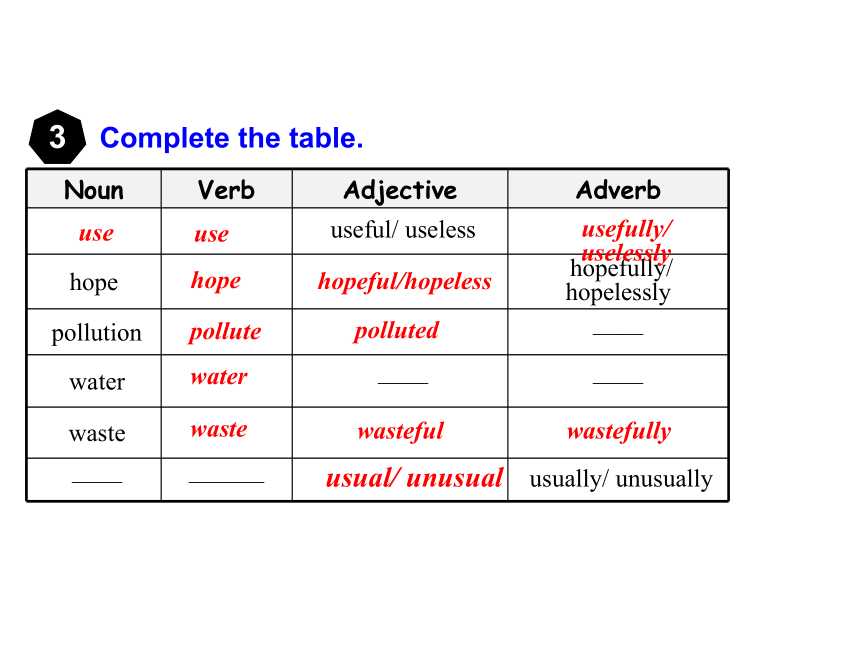
文档简介
(共24张PPT)
Module 12 Save our world
How many kinds of pollution
What causes the pollution
What should we do to solve the problems / Save the world
Free talk
A: What do you think cause the … pollution
B: …
A: What should we do to solve it
B: … because / so …
We can…by… We should…
Don’t…/ It’s better to…
It’s helpful / important to..
I suggest people should…
...
reduce the harm of
…is harmful to…
may cause…pollution
A: I agree. / That’s true. / That’s a good point.
/ I’m sorry, but I don’t agree. I think…
Pair work
1. _______ (use) means “use again”.
2. Though ________ (pollute) is heavy now, I don’t think it’s ________ (hope).
3. If the rivers are polluted, ________ (farm) can’t use the water for their crops.
4. If _______ (everyone) starts to do _________ (something), the world will be saved.
5. We all need a _______ (health) environment, but we produce _______ (waste) every day, and it is _______ (harm) to our environment.
Reuse
pollution
hopeless
farmers
everyone
something
healthy
waste
harmful
go
Ready
6. Do not ______ (waste) things.
7. Repeat these three words daily: reduce, _______ (use) and _______ (recycle).
8. Before you buy _________ (something) new, think whether it is _______ (real) necessary because maybe old one is just as good!
9. …but let’s take these simple steps today so that we will save the world for our _________ (grandson) and _________ (granddaughter) tomorrow.
waste
reuse
recycle
something
really
grandsons
granddaughters
Make new words. Join the parts of the words in Box A with the words in Box B. You need to use some of the parts more than once.
-able
-ful
im-
-less
re-
un-
care
collect
hope
possible
use
usual
wanted
waste
A
B
careful careless
collectable recollect
hopeful hopeless
impossible
reuse usable useful useless
unwanted
wasteful
unusual
1
课 堂 学 习
Now work in groups. Play the guessing game English for Fun.
1. full of care _________
2. can be collected
__________
3. full of hope _________
4. without any hope _____
5. not possible _________
6. not usual __________
7. without any use _____
8. use again __________
9. not wanted _________
10. making a lot of waste ___________
careful
collectable
hopeful
hopeless
impossible
unusual
useless
reuse
unwanted
wasteful
2 Complete the sentences with the words in the box.
hopeful impossible reuse unhealthy wasteful
1. Polluted water is _________.
2. It is _________ to throw so much food away.
3. If you look after things well, you may _______ some of them later.
4. It is _________ to clean up the whole river in such a short time.
5. If we pay attention to pollution now, the future will be _________.
unhealthy
wasteful
reuse
impossible
hopeful
Complete the table.
Noun Verb Adjective Adverb
useful/ useless
hope hopefully/ hopelessly
pollution ——
water —— ——
waste
—— ——— usually/ unusually
use
use
usefully/ uselessly
hope
hopeful/hopeless
pollute
polluted
water
waste
wasteful
wastefully
usual/ unusual
3
4
Complete the sentences with the correct form of the words in Activity 3.
She was _______ that her new job would make her more successful.
hopeful
1. The factory ________ (pollute) the river, and the fish died.
2. We often walk in the countryside. It is a(n) _______ (常有的) activity for us.
3. Do not use so much water. It is very ________.
4. To keep the flowers growing, you need to _______ (浇水) them once a day.
polluted
usual
wasteful
water
Mike: I hear you are off to the Caribbean for a
holiday! Lucky you! But aren’t you (1)
_____________ the pollution that such long
plane journeys may cause for the
environment
Ken: I know, but what can I do about it I already
try my best to protect the environment. I
recycle. I don’t (2) ___________ things if I
don’t want them any more. I (3)__________
the lights when I leave a room. Don’t tell me I
shouldn’t travel by plane any more!
be good for throw away turn off worry about
worried about
throw away
turn off
7
P102
Complete the conversation with the correct form of the expressions in the box.
Mike: No, of course not. But we can do more
to protect the environment. For
example, we can help keep the air clean
by planting trees. Trees (4) _________
the environment. In this way, we can
reduce the harm of pollution.
Ken: Good! So I can enjoy my holiday, and
when I come back, I’ll plant some trees!
Mike: That’s the idea! Maybe we can all join
in and start a small forest!
are good for
be good for throw away turn off worry about
1. It is OK to throw used things away. Looking after them takes a lot of time.
2. Do not throw away things made of glass, plastic and paper, but recycle them when possible.
3. Take a bag when you go shopping.
4. Producing electricity and using oil will not cause pollution.
5. Turn off lights when you do not need them.
6. Ride a bike or walk, and do not often drive your car.
8
P102
Listen and check (√) the true sentences.
√
√
√
√
×
×
Advice Reasons
1. Don’t throw away things made of ____________________, but ___________ them. Throwing things away is wasteful.
2. _____________ your plastic bags when you can and ____________ with you when you go shopping. Plastic bags ____________ recycle.
3. Use less electricity and oil to ____________.
4. Don’t leave lights on and ____________.
5. _____________ and do not often drive your car. Producing electricity and using oil may cause _______________.
glass, plastic and paper
recycle
Reuse
take a bag
are hard to
reduce pollution
waste electricity
Walk or cycle
pollution
P102
9 Listen again and complete the table.
Around the world
1. When is earth hour
2. What do people do on the special day Why
3. Which city held the first Earth Hour
4. Which cities took part in the event now
1 Make new words. Join the parts of the words in Box A with the words in Box B. you need to use some of the parts more than once.
-able
-ful
im-
-less
re-
un-
care
collect
hope
possible
use
usual
wanted
waste
A
B
careful careless
collectable
hopeful hopeless
impossible
reuse usable useful useless
unwanted
wasteful
unusual
英语中常见的构词法:
1. 合成法
2. 派生法 (加前缀、后缀)
3. 转化法(词性变词形不变)
(1). 合成名词
homework(家庭作业)
home
+
work
---
space + ship---spaceship(宇宙飞船)
after + noon---afternoon(下午)
(2). 合成动词
ill + treat---ill-treat(虐待)
sight + see---sight-see(观光)
(3). 合成形容词
hard + working---hard-working(勤奋的)
well + known---well-known(著名的)
world + famous---world-famous(世界闻名的)
(4). 合成副词
down + stair---downstairs(在楼下)
up + stairs---upstairs(在楼上)
(5). 合成代词
some +body---somebody(某人)
any +one---anyone(任何人)
(6). 合成介词
with +in---within(在…之内)
in +to---into(到…)
前缀 re- in(m)- un- dis-
意义 再/又 不/无 不/无 不/无
例子 rewrite incorrect uneasy dislike
reuse impossible
impolite untrue disagree
前缀:
前缀 inter- super- anti-
意义 互相 超 反对;防止
例子 inter
national superman anti-war
internet supermarket
superstar anti-pollution
1. 常见名词后缀
后缀:
(1). –an:
American ,
Indian
Canadian
Italian
(2). –er:
worker
driver
teacher
player
(3). –ess:
actress
waitress
(4). –ness:
illness
homelessness
kindness
happiness
(5). –or:
actor visitor sailor
(6). –ance: appearance (出现),
performance(表演)
(7). –ment: agreement (同意),
basement(地下室),
announcement(通知)
(8). –sion: decision (决心),
discussion(讨论),
conclusion(结论)
(9). –ist: artist(艺术家),scientist(科学家)
(11). –ful:helpful(有帮助的),
hopeful(有希望的),
powerful(有力量的) ,useful(有用的),
careful(仔细的), beautiful(漂亮的)
(12). –less:helpless(无帮助的),
hopeless (无希望的),, powerless(无力量的), useless(无用的), careless(粗心的)
(13). –ly: friendly(有好的), lovely(可爱的)
(14). –ing: interesting(有趣的),
exciting(激动人心的), boring(无聊的)
(15). –ed: interested(感兴趣的),
excited(感 到激动的,兴奋的),
surprised(吃惊的)
英语构词法中把一种词性转化为另一种词性而词形不变的方法称为转化法。
(1) v. → n.
— Let’s talk about it more.
— I think we’d better finish the talk now.
— 咱们再谈谈这件事吧。
— 我想我们最好现在结束谈话。
(2) n. → v.
— She gave me a cup of water.
— You should water the flowers twice a day.
— 她给了我一杯水。
— 你应该每天给这些花浇两次水。
(3) adj. → n.
— She was wearing a black dress.
— The girl in black looks very beautiful.
— 她穿着一条黑色的裙子。
—那个穿黑衣服的女孩看上去很漂亮。
Sometimes if you know the meaning of the parts of a word, you can work out the meaning of the whole word.
re + new + able renewable
again
can be
can be new again
Module 12 Save our world
How many kinds of pollution
What causes the pollution
What should we do to solve the problems / Save the world
Free talk
A: What do you think cause the … pollution
B: …
A: What should we do to solve it
B: … because / so …
We can…by… We should…
Don’t…/ It’s better to…
It’s helpful / important to..
I suggest people should…
...
reduce the harm of
…is harmful to…
may cause…pollution
A: I agree. / That’s true. / That’s a good point.
/ I’m sorry, but I don’t agree. I think…
Pair work
1. _______ (use) means “use again”.
2. Though ________ (pollute) is heavy now, I don’t think it’s ________ (hope).
3. If the rivers are polluted, ________ (farm) can’t use the water for their crops.
4. If _______ (everyone) starts to do _________ (something), the world will be saved.
5. We all need a _______ (health) environment, but we produce _______ (waste) every day, and it is _______ (harm) to our environment.
Reuse
pollution
hopeless
farmers
everyone
something
healthy
waste
harmful
go
Ready
6. Do not ______ (waste) things.
7. Repeat these three words daily: reduce, _______ (use) and _______ (recycle).
8. Before you buy _________ (something) new, think whether it is _______ (real) necessary because maybe old one is just as good!
9. …but let’s take these simple steps today so that we will save the world for our _________ (grandson) and _________ (granddaughter) tomorrow.
waste
reuse
recycle
something
really
grandsons
granddaughters
Make new words. Join the parts of the words in Box A with the words in Box B. You need to use some of the parts more than once.
-able
-ful
im-
-less
re-
un-
care
collect
hope
possible
use
usual
wanted
waste
A
B
careful careless
collectable recollect
hopeful hopeless
impossible
reuse usable useful useless
unwanted
wasteful
unusual
1
课 堂 学 习
Now work in groups. Play the guessing game English for Fun.
1. full of care _________
2. can be collected
__________
3. full of hope _________
4. without any hope _____
5. not possible _________
6. not usual __________
7. without any use _____
8. use again __________
9. not wanted _________
10. making a lot of waste ___________
careful
collectable
hopeful
hopeless
impossible
unusual
useless
reuse
unwanted
wasteful
2 Complete the sentences with the words in the box.
hopeful impossible reuse unhealthy wasteful
1. Polluted water is _________.
2. It is _________ to throw so much food away.
3. If you look after things well, you may _______ some of them later.
4. It is _________ to clean up the whole river in such a short time.
5. If we pay attention to pollution now, the future will be _________.
unhealthy
wasteful
reuse
impossible
hopeful
Complete the table.
Noun Verb Adjective Adverb
useful/ useless
hope hopefully/ hopelessly
pollution ——
water —— ——
waste
—— ——— usually/ unusually
use
use
usefully/ uselessly
hope
hopeful/hopeless
pollute
polluted
water
waste
wasteful
wastefully
usual/ unusual
3
4
Complete the sentences with the correct form of the words in Activity 3.
She was _______ that her new job would make her more successful.
hopeful
1. The factory ________ (pollute) the river, and the fish died.
2. We often walk in the countryside. It is a(n) _______ (常有的) activity for us.
3. Do not use so much water. It is very ________.
4. To keep the flowers growing, you need to _______ (浇水) them once a day.
polluted
usual
wasteful
water
Mike: I hear you are off to the Caribbean for a
holiday! Lucky you! But aren’t you (1)
_____________ the pollution that such long
plane journeys may cause for the
environment
Ken: I know, but what can I do about it I already
try my best to protect the environment. I
recycle. I don’t (2) ___________ things if I
don’t want them any more. I (3)__________
the lights when I leave a room. Don’t tell me I
shouldn’t travel by plane any more!
be good for throw away turn off worry about
worried about
throw away
turn off
7
P102
Complete the conversation with the correct form of the expressions in the box.
Mike: No, of course not. But we can do more
to protect the environment. For
example, we can help keep the air clean
by planting trees. Trees (4) _________
the environment. In this way, we can
reduce the harm of pollution.
Ken: Good! So I can enjoy my holiday, and
when I come back, I’ll plant some trees!
Mike: That’s the idea! Maybe we can all join
in and start a small forest!
are good for
be good for throw away turn off worry about
1. It is OK to throw used things away. Looking after them takes a lot of time.
2. Do not throw away things made of glass, plastic and paper, but recycle them when possible.
3. Take a bag when you go shopping.
4. Producing electricity and using oil will not cause pollution.
5. Turn off lights when you do not need them.
6. Ride a bike or walk, and do not often drive your car.
8
P102
Listen and check (√) the true sentences.
√
√
√
√
×
×
Advice Reasons
1. Don’t throw away things made of ____________________, but ___________ them. Throwing things away is wasteful.
2. _____________ your plastic bags when you can and ____________ with you when you go shopping. Plastic bags ____________ recycle.
3. Use less electricity and oil to ____________.
4. Don’t leave lights on and ____________.
5. _____________ and do not often drive your car. Producing electricity and using oil may cause _______________.
glass, plastic and paper
recycle
Reuse
take a bag
are hard to
reduce pollution
waste electricity
Walk or cycle
pollution
P102
9 Listen again and complete the table.
Around the world
1. When is earth hour
2. What do people do on the special day Why
3. Which city held the first Earth Hour
4. Which cities took part in the event now
1 Make new words. Join the parts of the words in Box A with the words in Box B. you need to use some of the parts more than once.
-able
-ful
im-
-less
re-
un-
care
collect
hope
possible
use
usual
wanted
waste
A
B
careful careless
collectable
hopeful hopeless
impossible
reuse usable useful useless
unwanted
wasteful
unusual
英语中常见的构词法:
1. 合成法
2. 派生法 (加前缀、后缀)
3. 转化法(词性变词形不变)
(1). 合成名词
homework(家庭作业)
home
+
work
---
space + ship---spaceship(宇宙飞船)
after + noon---afternoon(下午)
(2). 合成动词
ill + treat---ill-treat(虐待)
sight + see---sight-see(观光)
(3). 合成形容词
hard + working---hard-working(勤奋的)
well + known---well-known(著名的)
world + famous---world-famous(世界闻名的)
(4). 合成副词
down + stair---downstairs(在楼下)
up + stairs---upstairs(在楼上)
(5). 合成代词
some +body---somebody(某人)
any +one---anyone(任何人)
(6). 合成介词
with +in---within(在…之内)
in +to---into(到…)
前缀 re- in(m)- un- dis-
意义 再/又 不/无 不/无 不/无
例子 rewrite incorrect uneasy dislike
reuse impossible
impolite untrue disagree
前缀:
前缀 inter- super- anti-
意义 互相 超 反对;防止
例子 inter
national superman anti-war
internet supermarket
superstar anti-pollution
1. 常见名词后缀
后缀:
(1). –an:
American ,
Indian
Canadian
Italian
(2). –er:
worker
driver
teacher
player
(3). –ess:
actress
waitress
(4). –ness:
illness
homelessness
kindness
happiness
(5). –or:
actor visitor sailor
(6). –ance: appearance (出现),
performance(表演)
(7). –ment: agreement (同意),
basement(地下室),
announcement(通知)
(8). –sion: decision (决心),
discussion(讨论),
conclusion(结论)
(9). –ist: artist(艺术家),scientist(科学家)
(11). –ful:helpful(有帮助的),
hopeful(有希望的),
powerful(有力量的) ,useful(有用的),
careful(仔细的), beautiful(漂亮的)
(12). –less:helpless(无帮助的),
hopeless (无希望的),, powerless(无力量的), useless(无用的), careless(粗心的)
(13). –ly: friendly(有好的), lovely(可爱的)
(14). –ing: interesting(有趣的),
exciting(激动人心的), boring(无聊的)
(15). –ed: interested(感兴趣的),
excited(感 到激动的,兴奋的),
surprised(吃惊的)
英语构词法中把一种词性转化为另一种词性而词形不变的方法称为转化法。
(1) v. → n.
— Let’s talk about it more.
— I think we’d better finish the talk now.
— 咱们再谈谈这件事吧。
— 我想我们最好现在结束谈话。
(2) n. → v.
— She gave me a cup of water.
— You should water the flowers twice a day.
— 她给了我一杯水。
— 你应该每天给这些花浇两次水。
(3) adj. → n.
— She was wearing a black dress.
— The girl in black looks very beautiful.
— 她穿着一条黑色的裙子。
—那个穿黑衣服的女孩看上去很漂亮。
Sometimes if you know the meaning of the parts of a word, you can work out the meaning of the whole word.
re + new + able renewable
again
can be
can be new again
同课章节目录
- Module 1 Wonders of the world
- Unit 1 It's more than 2,000 years old.
- Unit 2 The Grand Canyon was not just big.
- Unit 3 Language in use
- Module 2 Public holidays
- Unit 1 My family always go somewhere interesting a
- Unit 2 We have celebrated the festival since the f
- Unit 3 Language in use
- Module 3 Heroes
- Unit 1 She trained hard,so she became a great play
- Unit 2There were few doctors, so he had to work ve
- Unit 3 Language in use
- Module 4 Home alone
- Unit 1 I can look after myself, although it won’t
- Unit 2 I became so bored with their orders that I
- Unit 3 Language in use
- Module 5 Museums
- Unit 1 Don't cross that rope!
- Unit 2 If you ever go to London, make sure you vis
- Unit 3 Language in use
- Module 6 Problems
- Unit 1 If I start after dinner, I'll finish it be
- Unit 2 If you tell him the truth now, you will sho
- Unit 3 Language in use
- Revision Module A
- Module 7 Great books
- Unit 1 We're still influenced by Confucius's idea
- Unit 2 It is still read and loved.
- Unit 3 Language in use
- Module 8 Sports life
- Unit 1 Daming wasn't chosen for the team last time
- Unit 2 He was invited to competitions around the w
- Unit 3 Language in use
- Module 9 Great inventions
- Unit 1 Will computers be used more than books in t
- Unit 2 Will books be replaced by the Internet?
- Unit 3 Language in use
- Module 10 Australia
- Unit 1 I have some photos that I took in Australia
- Unit 2 The game that they like most is Australian
- Unit 3 Language in use
- Module 11 Photos
- Unit 1 He's the boy who won the photo competition
- Unit 2 The photo which we liked best was taken by
- Unit 3 Language in use
- Module 12 Save our world
- Unit 1 If everyone starts to do something, the wor
- Unit 2 Repeat these three words daily: reduce, reu
- Unit 3 Language in use
- Revision Module B
